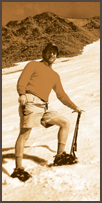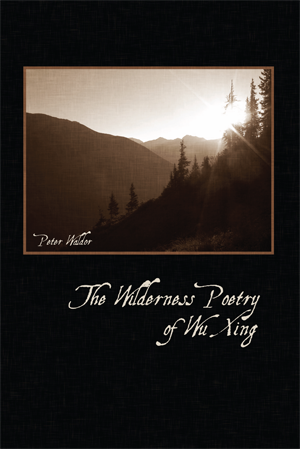
Page last updated: November 23, 2018
All pages copyright © 2018 by Pinyon Publishing
THE WILDERNESS POETRY OF WU XING
by Peter Waldor
One is bound to ask who Wu Xing was and what were the particulars of his life. Was he a mountain sage hailing from a distant time and far off place? Was his teacher Do Sa the prophet of a lost religion? Across the centuries, only the poetry has survived. Even the name Wu Xing was probably not his real name but a pen name taken to better reflect the spirit of the poetry. The name translates to “nothingness.” Nothingness here means its very opposite. Wu was so quiet, his mind so empty, that he could fill himself with these timeless lyrics. This is deep wilderness poetry, but it can be read or recited just as profoundly, whether you are caught in a big city traffic jam or are yourself, like Wu, finding your own trail far away from everyone else.
 PETER WALDOR is the author of Door to a Noisy Room, which was a finalist for the 2009 National Jewish Book Award. His book length poem “Leg Paint” appeared in the online magazine Mudlark. His work has been published in many journals, including The American Poetry Review, Ploughshares, The Iowa Review, Colorado Review, Pinyon Review, Poetry Daily, Verse Daily, and Mothering Magazine. Waldor works in the insurance business and lives in northern New Jersey and Telluride, Colorado.
PETER WALDOR is the author of Door to a Noisy Room, which was a finalist for the 2009 National Jewish Book Award. His book length poem “Leg Paint” appeared in the online magazine Mudlark. His work has been published in many journals, including The American Poetry Review, Ploughshares, The Iowa Review, Colorado Review, Pinyon Review, Poetry Daily, Verse Daily, and Mothering Magazine. Waldor works in the insurance business and lives in northern New Jersey and Telluride, Colorado.
PRAISE FOR THE WILDERNESS POETRY OF WU XING
June 25, 2013 A Word’s Worth Review: “The Wildreness Poetry of Wu Xing evokes curiosity about the ancient poet Wu Xing and his succinct poems, as Waldor’s spare verse echoes his master’s voice in the wilderness ... written with the touch of a word watercolorist ... Waldor illuminates the ineffable with powerful lyrics that have a minimal construct ...” Read the Full Review.
“Peter Waldor’s new book combines the unaffected, wise, intimate tone of the old Asian masters, sometimes joyful, sometimes heartbroken, often affectionate, with a tone of his own, a 21st century, ‘first world’ voice, more jaunty and optimistic-seeming, yet sometimes struggling for breath, for the ground under his feet: ‘… cups of thin air. / Knife edge. / Nothing on the sides. / Nothing in the past. / Nothing in the future.’ (‘Knife Edge Ridge’). Many sounds and textures of wonder and of nothingness are drawn here, to keep us warm and uninsistent company in our own wilderness.”—JEAN VALENTINE, winner of the National Book Award for Door in the Mountain
“Spare, trenchant, whimsical … these small gems of poetry seamlessly meld the heart of a sage with the soul of a mountain man.”—CYNTHIA BOURGEAULT, author of Love Is Stronger than Death, The Wisdom Way of Knowing, and The Meaning of Mary Magdalene